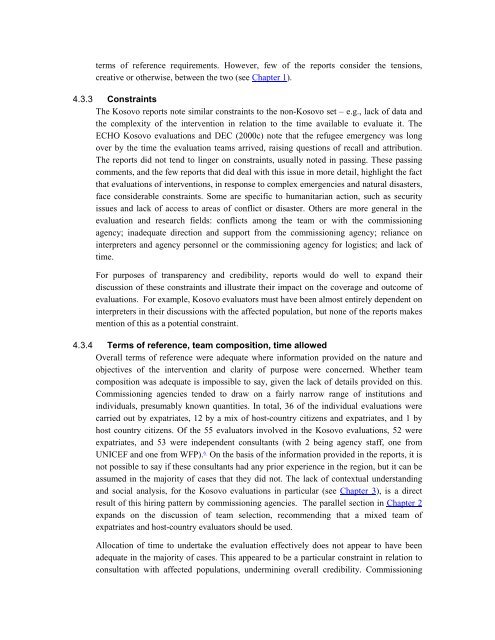Download PDF - ReliefWeb
Download PDF - ReliefWeb
Download PDF - ReliefWeb
You also want an ePaper? Increase the reach of your titles
YUMPU automatically turns print PDFs into web optimized ePapers that Google loves.
terms of reference requirements. However, few of the reports consider the tensions,<br />
creative or otherwise, between the two (see Chapter 1).<br />
4.3.3 Constraints<br />
The Kosovo reports note similar constraints to the non-Kosovo set – e.g., lack of data and<br />
the complexity of the intervention in relation to the time available to evaluate it. The<br />
ECHO Kosovo evaluations and DEC (2000c) note that the refugee emergency was long<br />
over by the time the evaluation teams arrived, raising questions of recall and attribution.<br />
The reports did not tend to linger on constraints, usually noted in passing. These passing<br />
comments, and the few reports that did deal with this issue in more detail, highlight the fact<br />
that evaluations of interventions, in response to complex emergencies and natural disasters,<br />
face considerable constraints. Some are specific to humanitarian action, such as security<br />
issues and lack of access to areas of conflict or disaster. Others are more general in the<br />
evaluation and research fields: conflicts among the team or with the commissioning<br />
agency; inadequate direction and support from the commissioning agency; reliance on<br />
interpreters and agency personnel or the commissioning agency for logistics; and lack of<br />
time.<br />
For purposes of transparency and credibility, reports would do well to expand their<br />
discussion of these constraints and illustrate their impact on the coverage and outcome of<br />
evaluations. For example, Kosovo evaluators must have been almost entirely dependent on<br />
interpreters in their discussions with the affected population, but none of the reports makes<br />
mention of this as a potential constraint.<br />
4.3.4 Terms of reference, team composition, time allowed<br />
Overall terms of reference were adequate where information provided on the nature and<br />
objectives of the intervention and clarity of purpose were concerned. Whether team<br />
composition was adequate is impossible to say, given the lack of details provided on this.<br />
Commissioning agencies tended to draw on a fairly narrow range of institutions and<br />
individuals, presumably known quantities. In total, 36 of the individual evaluations were<br />
carried out by expatriates, 12 by a mix of host-country citizens and expatriates, and 1 by<br />
host country citizens. Of the 55 evaluators involved in the Kosovo evaluations, 52 were<br />
expatriates, and 53 were independent consultants (with 2 being agency staff, one from<br />
UNICEF and one from WFP). 6 On the basis of the information provided in the reports, it is<br />
not possible to say if these consultants had any prior experience in the region, but it can be<br />
assumed in the majority of cases that they did not. The lack of contextual understanding<br />
and social analysis, for the Kosovo evaluations in particular (see Chapter 3), is a direct<br />
result of this hiring pattern by commissioning agencies. The parallel section in Chapter 2<br />
expands on the discussion of team selection, recommending that a mixed team of<br />
expatriates and host-country evaluators should be used.<br />
Allocation of time to undertake the evaluation effectively does not appear to have been<br />
adequate in the majority of cases. This appeared to be a particular constraint in relation to<br />
consultation with affected populations, undermining overall credibility. Commissioning
















![CynefinFramework final [Read-Only]](https://img.yumpu.com/19017304/1/190x135/cynefinframework-final-read-only.jpg?quality=85)